#meg brooke
Text
Meg March: The Nurturer
Every time I reread Little Women, I find Meg March more relatable. This isn't because I am a wife or have kids but because I think Meg represents issues all women face and her story has only gotten more relevant since the book was released.
Meg gets three chapters focusing on her struggles: “Meg Goes to Vanity Fair” in Part I and “Domestic Experiences” and “On the Shelf” in Part II. “Meg Goes to Vanity Fair” appears in most adaptations and involves Meg going to visit rich friends for a fortnight and getting her head turned by luxuries the Marches can't afford. The other most commonly adapted scene is one from “Domestic Experiences” where Meg buys $50 of silk that she and her husband can't afford.
Even in the novel, I’m not fond of this scene because it doesn't do anything to give us any new insights into Meg that we didn't already get in “Meg Goes to Vanity Fair.” Going off these two scenes, it seems like her main struggle is that she hates being poor, but I think a fuller picture starts to form when you look at all the Meg-focused chapters together.
“Domestic Experiences” starts with the lines, “Like most other young matrons, Meg began her married life with the determination to be a model housekeeper. John should find home a paradise; he should always see a smiling face, should fare sumptuously every day, and never know the loss of a button.” It's clear that Meg has some decided ideas on what a proper wife should be, and those ideas leave very little wiggle room for the mistakes and accidents that are part of everyone's life. Meg even tells John he should feel free to bring a guest home for dinner without sending word home to her first!
One day, Meg is trying to outfit her house with homemade preserves. Try as she might, the jelly won't jell. She and John have promised not to go home to ask advice for every small trouble, so Meg goes it alone until she is so frustrated that she sits right down on the kitchen floor and starts sobbing.
To make matters worse, John forgets that today is the day Meg is working on the jelly and invites a friend over for dinner. He is not met, as usual, by a smiling wife but instead finds a house devoid of life until he finds Meg still crying in the kitchen. John is so worried that she has been seriously injured or received terrible news that when Meg tells him what really happened, he laughs with relief, tells her not to worry about the jelly, and that he and his friend don't need a fancy dinner, just some cold meat, bread, and cheese will do.
Alas, in the 1860s, the charcuterie did not have the same air of sophistication it enjoys today! Meg is horrified at the idea of treating a guest in her home to a meal like that and hurt by how lightly John seems to be treating the matter. She lashes out, which leads to the couple’s first fight. Eventually they are able to reconcile and their marriage is made stronger in the mending.
The scene from “On the Shelf” features some very similar circumstances, this time pertaining to motherhood. When Meg gives birth to twins Demi and Daisy, she becomes completely absorbed in motherhood, spending all her time with her children and thinking about little else. She even refuses to let John in the nursery and tries to do everything on her own.
As a result, John begins to feel like an interloper in his own home and starts spending more time away from it. Meg is extremely worn out and feels neglected, imagining that the changes in her household are a result of her becoming unattractive and John losing interest in her.
Fortunately, Meg gets some excellent advice from Marmee: Practice self-care, give the kids to a sitter sometimes so she and John can go on dates and have adult conversations and interests, and let John help out with the babies. The advice works and peace is once again restored.
When viewed together, we see Meg’s trouble isn't so much a love of luxury as it is perfectionism and a tendency to put too much stock in the voices telling her what it means to be a good woman, a good wife, and a good mother. Now, isn't that relatable? What woman hasn't felt like they were simultaneously too much and not enough? Who hasn't compared the shiny pictures of our friends’ lives that we see on social media to the less than perfect parts of our life that don't get posted on Instagram?
If Meg was alive today, I think she would get really into mommy blogs telling her that she needs to make her own baby food from scratch if she wants to give her children the best life possible. She would watch Marie Kondo videos on YouTube and cry because her living room often looks like a disaster zone after her two toddlers are done with it.
This was what I tried to bring to the adulthood character role I based on Meg, the Nurturer. I didn't want a role that implied that becoming a homemaker is settling because I think that Meg legitimately loves her life and being a stay-at-home spouse or parent is just as valid a choice as becoming celebrated for a career.
Instead, what I tried to do was take the cares and the joys of Meg March and turn them into something that would be fun and compelling to play. The main points I wanted to focus on were the amount of unsolicited advice that homemakers commonly get and the perfectionism and fear of failure that often lead to burnout.
The positive conditions for the Nurturer involve receiving love and support from your family and being seen as a model for perfect home management. The negative conditions are about being completely worn out and being the subject of your neighbor’s criticisms. I'm very proud of the role I was able to create, and I think it's a good example of a type of character you can play that will feel very different from one you might make in Good Society. I hope that you will enjoy playing as the Nurturer, too.
This is part of a series on the literary inspirations behind game elements for my upcoming tabletop RPG based on the novels of Louisa May Alcott and L.M. Montgomery, Castles in the Air. To see a complete list of the posts I've written thus far, check out the master post. If you would like more information, visit the game's website!
14 notes
·
View notes
Text
The chapter in the book Little Women/Good Wives, and the scene in the movies of Jo's proposal and married life are So Important. They show the heroine living a happy and unconventional lifestyle: It says that this life she leads with work, marriage, and very little money is a good, wholesome life. That is so important.
But - I think an overlooked chapter in the books (not depicted in the films that I have seen) is the one in which Meg tries to cook and preserve currant jam. She has a miserable day, turned even worse when her husband John brings home a friend for dinner. For once, Meg snaps at him and he snaps back when provoked.
Eventually, Meg takes some good advhice from Marmee, and she brings peace. The chapter ends with a line about married life foe these two not being perfect - it will always have its difficulties, but peace has been preserved and quarrels will be managed.
In another chapter, after Meg has had twins, she understandable becomes so wrapped up in them that she neglects both herself and her husband. Neither the book nor I are saying that one partner should be a servant to the other. But in marriage, we have promised something of ourselves to them*. Meg has isolated herself from the world and grown irritable while she rarely sees John who spends time at his friend's house instead of being nagged at home.
Again, Meg takes initiative and fixes it. This is a bit of a pattern that we see the world over today, in which women usually take the emotional burden in the home. I have no comment to make on that, it's not the point of this post.
The point is: The book has made a few excellent points through everyday, domestic scenes about marriage which are not (or only rarely) shown on film. The glamour, unpredictability and excitement of Jo's publishing, marriage to the Professor, work and, from a plot-based POV, the fact that she is the main character, mean that her storyline is in the spotlight. I love her storyline. But I also think that Meg's has something important to teach us: If you choose the more traditional path, your life is just as full of adventure and growth, difficulties, pain and pleasures.
*talking about non-toxic nd non-abusive relationships.
#meg marg#little women#meg brooke#john brooke#marmee#book little women#book analysis#book to film#film adaptation#louise may alcott#bookaholic#stories#book
57 notes
·
View notes
Text
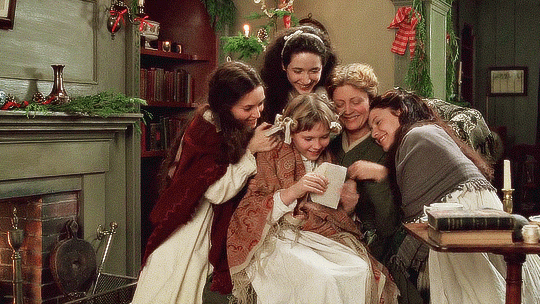

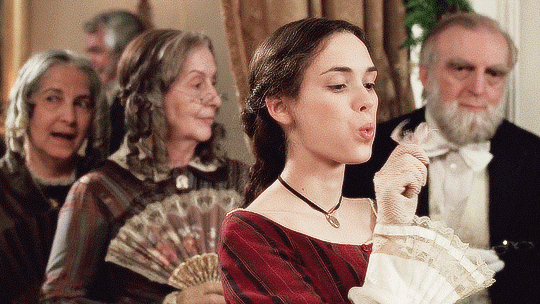
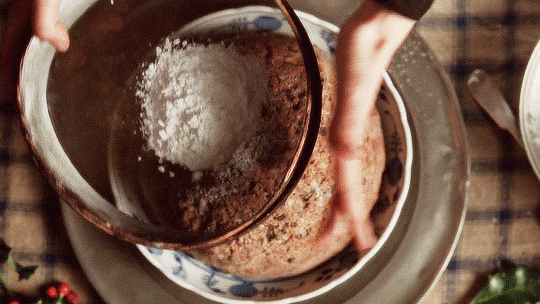

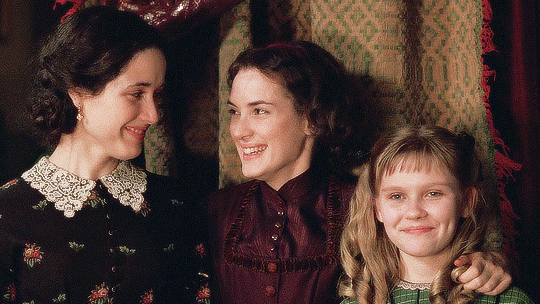


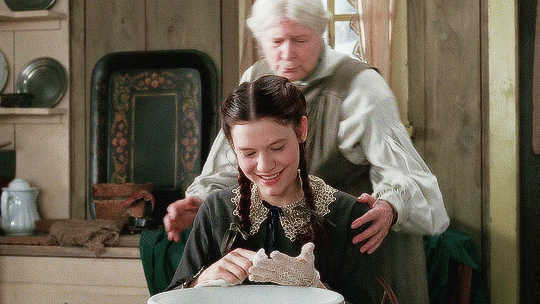

—Little Women (Gillian Armstrong, 1994)
#Little Women (1994)#Winona Ryder#Jo March#Kirsten Dunst#Amy March#Claire Danes#Beth March#Trini Alvarado#Meg March#Christian Bale#Theodore “Laurie” Laurence#Eric Stoltz#John Brooke#Susan Sarandon#Marmee March#Florence Paterson#Hannah#Christmas#Kiss | John and Meg#Snow
242 notes
·
View notes
Text
So I’m not sure if it was Greta Gerwig herself or a movie reviewer but I once read a criticism of the men in Little Women, saying that the March women’s husbands are all varying degrees of useless or disrespectful. Saying that John belittles Meg and her housework and that Friedrich has no respect for Jo’s work. And I have to say… what??
Meg and John are a great example of a healthy couple. Yes, he laughs when her jelly doesn’t turn out, but is he belittling her? No! He just finds it amusing because it is, at least to an observer. And he gets miffed that the house isn’t in order, but in fairness, she did say he could bring a friend whenever and dinner would be ready. They go through rough patches, but they always talk it out and keep on pulling as a team.
And the big one that everyone is mad about, Friedrich criticizing Jo’s writing. I think these people didn’t read the book because Fritz never reads Jo’s sensational stories. He finds a story in a newspaper — specifically stated to not be one of hers — and broadly criticizes that kind of story. This isn’t directed at Jo, it’s directed at writers of these stories in general (again, Friedrich doesn’t know Jo is one of them). But Jo takes his words to heart because he’s spoken to her conscience, and then she makes the decision to burn them all up and quit writing that genre of story. She listens to him because she knows him to have a strong moral compass, which is a big part of why she likes him so much. He helps her grow and become a better person and writer without having to give her direct advice!! And that’s beautiful!! And I’m sick of people who wanted Jo to stay single taking their disappointment and turning it into “all the husbands in Little Women were bad husbands and the second half is a commentary on how terrible it is to be married.” No. Stop it. Read the book. Cut it out with the cynicism.
#little women#little women 2019#louisa may alcott#jo march#meg march#john brooke#friedrich bhaer#jo x friedrich#meg x john#elly's posts
165 notes
·
View notes
Text
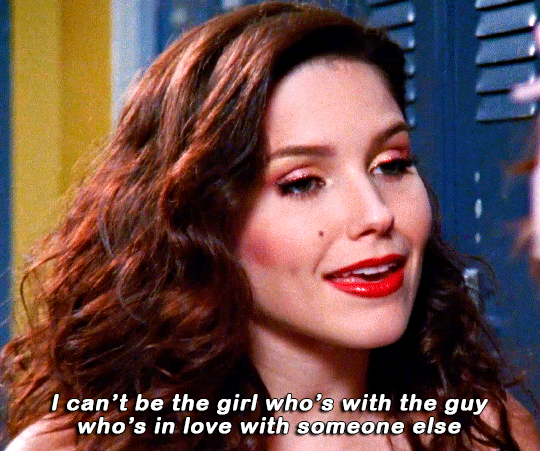

Brooke Davis I 7.15
#brooke davis#one tree hill#brookedavisedit#bdavisedit#brookedaily#othedit#othladies#onetreehilldaily#cwladiesdaily#bitchys#televisiongifs#onetreehilledit#ours#by meg#television
230 notes
·
View notes
Text
Some “Little Women” thoughts – In defense of Meg’s marriage
@littlewomenpodcast, @thatscarletflycatcher, @joandfriedrich
Whether Little Women is a feminist book or an anti-feminist book will probably be debated forever.
Most of the debate seems to center around the character of Jo: whether she’s depressingly “tamed” in the end or matures in a healthy way, whether her marriage is anti-feminist or not, and whether or not it’s “anti-feminist” that in the end she’s a schoolmistress instead of a famous author. (Though of course she’ll eventually be a famous author in Jo’s Boys.) But similar debate surrounds the other March sisters too, for various reasons.
Not even Meg, the sister whom readers most often seem to overlook, is spared from these debates. Many feminist critics, such as (but not limited to) Samantha Ellis in her book How to Be a Heroine, have criticized the chapters depicting Meg and John Brooke’s married life in Part II. They label those chapters “depressing,” and they feel as if Meg and John are constantly at odds with each other and miserable. They argue that each of their marital conflicts ends with Meg learning to be a more submissive wife who placates and effaces herself for her husband. And they despise John, labeling him “selfish” and “disrespectful.”
Sometimes I wonder if I read the same book that they did.
It seems obvious to me that Meg and John’s marriage is a happy and healthy one: Alcott is just honest about the fact that even the happiest marriage includes conflict and requires work. Some of these critics seem to think fictional marriages only exist in two forms, “perfect” and “toxic,” with no in-betweens. Nor does John deserve half the negative commentary he gets, nor does Meg’s personal growth within her marriage consist of learning to be a submissive or self-effacing wife. On the contrary, much of her growth consists of her learning that she doesn’t need to be a “perfect” housewife and mother who gives and demands too much of herself, and their marriage becomes more of an equal partnership by the end, not less of one.
Let’s look in depth all three of Meg and John’s marital conflicts.
First there’s the jelly incident.
Here we see the first of a recurring theme: Meg is determined to be the perfect housewife and is "over-anxious to please.” She wants to do everything right and do it all by herself, because she’s afraid that otherwise, she'll be a failure. In terms of her personality type, I agree with @funkymbtifiction that Meg is an ESFJ. In the book, if not in all adaptations, Meg and Amy are both ESFJs: Amy is more of the sparkling “Glinda in Wicked” variety, while Meg, apart from her streak of vanity, is more of the down-to-earth, motherly, “Mrs. Potts in Beauty and the Beast” variety. But Meg in particular shows what @alittlebitofpersonality calls the ESFJ Type Angst. Her eagerness to manage her marriage and motherhood in the most pleasant, correct way (her strong Fe and Si) and her fear of possible failure (her weak Ne and Ti) give her, in A Little Bit of Personality’s words, a “frantic desire to do everything and get it done right now,” so she drives herself too hard.
She shouldn’t have promised John that he could bring home a dinner guest at any time; that’s unrealistic. Nor should she have tried to make jelly for the first time in her life using only the memory of watching Hannah make it; she should have invited Hannah over to help her. Nor should she have become so absorbed in making and re-making the jelly that she didn’t cook dinner; nor should she have let herself be so distraught about the failed jelly, or lost her temper with John and then run to her room, leaving him to improvise a bread-and-cheese dinner and entertain Mr. Scott alone.
John is also at fault and acknowledges it. He shouldn’t have forgotten that Meg was making jelly that day and brought home a guest without warning. He shouldn’t have laughed at Meg’s anguish over the failed jelly, nor should he have joked that he and Mr. Scott “won’t ask for jelly” with dinner. But let’s be fair to John. His laughter is probably just as much out of relief as out of amusement, because when he first comes home and finds Meg sobbing, he worries that something terrible has happened. Then, when he realizes no food has been cooked, he’s understandably annoyed because he’s come home from work tired and hungry, with a guest too, and Meg hasn’t done what she promised she would. But he doesn’t lose his temper; he stays calm and amiable and accepts a cold-cut meal; he just gives his annoyance a tiny vent with his joking barb about the jelly. Then Meg overreacts in response.
In the hours afterwards, he and Meg are still polite to each other, just a bit distant, each sorry but waiting for the other to apologize first. Then, when Meg finally breaks the ice, they both apologize (not just Meg – in fact only John verbally apologizes, Meg just does it with a kiss), everything is fine again, and from then on they both laugh about the incident.
Maybe by modern standards, it is problematic that Marmee has urged Meg to be careful not to make John angry and to always apologize first when they’re both at fault. But it’s not because John has “a volcanic temper,” as Samantha Ellis inexplicably claimed– he so clearly doesn’t! Nor is Marmee’s message “Men are less forgiving than women so we need to placate them.” She’s not talking about “men,” but about John the individual, and she’s not urging Meg to placate him either. All she means is that John’s anger doesn’t flare up and die quickly like the March women’s, but simmers much longer because he represses it.
Then there’s the silk incident.
Say what you will about vanity-shaming and other gendered implications (which of course are valid), but Meg didn’t need an expensive silk dress, and she shouldn’t have ordered it without telling John. It’s not that a wife should ask her husband’s permission to spend money; it’s that no one, regardless of gender, should do anything behind their spouse’s back that they’re ashamed to admit. And again, John doesn’t get angry. He accepts the expense without complaining. He’s just hurt; he works so hard to provide for Meg, and the fact that what he provides isn’t good enough for her, that she says “I’m tired of being poor,” makes him feel inadequate. Yet he tries not to show his hurt and is willing to let Meg have the dress. He cancels his own order for a new overcoat so they can afford it; he’s willing to sacrifice something he needs for something Meg wants but doesn’t need. When Meg sells the silk and buys the overcoat for John instead, she’s only repaying his selflessness in kind.
Finally, we reach the chapter “On the Shelf.”
I’ve read several feminist articles that criticize this chapter and especially John’s behavior in it. But I don’t agree with any of them. John isn’t being selfish the way Meg briefly thinks he is; he’s not jealous of her attention to the twins. By all appearances, Meg genuinely neglects him and overwhelms herself too, because she devotes every waking moment to her two toddlers and thinks no one can properly take care of them but herself. Again she’s trying to be superhuman because she’s afraid of failure. She doesn’t let John be a parent to his own children, or take any time to relax either, and she spoils the twins and makes things harder for herself by giving in to their tantrums. I understand why some feminists are rankled when John starts spending his evenings elsewhere, Meg feels ignored, and Marmee tells her it’s her own fault for forgetting ‘her duty to her husband.” But even if that wording isn’t ideal by modern standards, it's arguably true. To blame John for “not bothering” to help take care of the twins and “forcing” Meg to do it all alone, as some of these critics do, is just the opposite of what the chapter means to convey.
And again, John doesn’t get angry or complain. Nor, unlike what some of these critics seem to think, does he cheat on Meg, either physically or emotionally. He just goes to visit the Scotts rather than feel lonely and useless at home (where Samantha Ellis got the idea that he goes to “what sounds like a dodgy establishment” is beyond me; it’s a friend’s house), and just because Meg worries that his eye is roving to pretty Mrs. Scott doesn’t mean it is.
Arguably, this chapter has a very feminist message about egalitarian marriage and co-parenting. Instead of doing all the work alone and sacrificing her own wellbeing, Meg learns to share her parenting duties with John, and to let Hannah babysit often so they can have much-needed time to themselves too. She also starts to converse with John about politics, so he doesn’t constantly feel the need to seek out a male friend to discuss them, and he returns the favor by conversing with her about domestic subjects too. Traditional gender divides are relaxed. By the end of the chapter, their marriage is more balanced and equal than ever.
I’ve also read complaints about John’s co-parenting. The fact that Meg is portrayed as too soft-hearted, spoiling rowdy Demi and needing John to discipline him. The fact that John and therefore Alcott advocates the potentially traumatic “cry it out” method of sleep training. The fact that John insists on handling Demi’s tantrum in his own way despite Meg’s objections and Meg reluctantly gives in, with references to John’s “masterful tone” and Meg’s “docility.” The possible sexist implication that John knows how to parent better than Meg does.
But I don’t think Alcott meant to imply that John is a better parent than Meg or meant us to see him as lording over her. Even though he won’t let her give in to Demi’s demands, what finally stops Demi’s tantrum is a kiss from Meg after he’s been allowed to cry for a few minutes. They solve the problem together by combining John’s discipline with Meg’s tenderness. Then John shows tenderness of his own by lying down on the bed and holding Demi as he falls asleep, so it’s not a straightforward “cry it out” that he (or Alcott) advocates for sleep training, but something closer to the Ferber Method.
Of course there is an old-fashioned, traditional aura to Meg and John’s marriage and to their roles in the house: Meg as homemaker and John as breadwinner, Meg as nurturer and John as disciplinarian to the twins, and her fondness for sitting in his lap. But of the four March sisters, Meg was always the most traditional young woman of her era. Her marriage dynamic might not be what Jo or even Amy would want, but it’s just right for Meg. And Alcott shows us that with the right effort, even a basically traditional marriage can be egalitarian and mutually healthy.
The one feminist complaint I might sympathize with is that all three of these episodes do revolve around Meg learning to be a better wife. In each instance, Meg is portrayed as being more at fault than John, and she’s the one who learns the chief lesson. But I don’t consider this a sexist choice either. The March sisters are the protagonists of Little Women. Their coming-of-age journeys and personal growth are the focal point. John is a supporting character, so it’s arguably only natural that the “married life” chapters focus more on Meg’s personal growth than on his.
These are the reasons why I personally enjoy the chapters revolving around Meg and John’s marriage, and why I don’t consider them problematic or “depressing.” They’re just a realistic portrayal of the struggles, mistakes, and conflicts that occasionally rise within a happy marriage, which are resolved in a healthy way when both partners put in the necessary work. I understand where the critics who dislike those chapters are coming from, but I can’t bring myself to agree.
#little women#louisa may alcott#meta#analysis#meg march#john brooke#marriage#parenting#feminism#rambling
93 notes
·
View notes
Text
I really like this scene when Brook takes a nap and he hears noises of Straw Hats doing various things: Nami and Robin talking, Sanji cooking, Chopper making medicine, Franky working, Zoro training, Luffy and Usopp sleeping... even Luffy's growling stomach.
I like the overall indication that Brook now can sleep peacefully, because there's life around him again; that he's not alone anymore. It's such a sweet notion.
Why can't we have more fillers like that?
#meg rewatches one piece#one piece#soul king brook#nami#nico robin#black leg sanji#tony tony chopper#cyborg franky#roronoa zoro#monkey d. luffy#usopp
83 notes
·
View notes
Text

my god this reminds me, of when we were young
a Little Women modern AU series
9k // rated t
#littlewomenedit#little women#little women 2019#amy x laurie#meg x john#march sisters#jo march#laurie laurence#amy march#meg march#beth march#john brooke#modern little women#modern au#my fics#my moodboards#all images from pintrest
111 notes
·
View notes
Text

outside they’re push and shoving / you’re in the kitchen humming
Part 13/?? of my favorite ships x taylor swift songs | Meg March x John Brooke
#sorry but bbc Meg March OUTSOLD#John Brooke#meg march#Meg x John#bbc little women#little women aesthetic#katie’s favorite ships x favorite taylor swift songs#little women#my moodboards#Katie’s ships & songs
33 notes
·
View notes
Text
Meg/Jo/Laurie: You tolerate me.
John/Friedrich/Amy: I love you.
#submission#little women#incorrect quotes#meg march#jo march#theodore laurence#john brooke#friedrich bhaer#amy march#meg and john#meg x john#jo x friedrich#jo and friedrich#amy and laurie#amy x laurie
26 notes
·
View notes
Photo








kelseylynncook: Who had the best runway walk? Thanks Disney for inviting me to the HSMTMTS Season 3 World Premiere ✨
#hsmtmts#hsmtmtsedit#hsmtmtsnet#hsmtmtsdaily#userromi#userrajan#*#sofia wylie#joshua bassett#dara renee#matt cornett#meg donnelly#larry saperstein#adrian lyles#joe serafini#frankie rodriguez#corbin bleu#kate reinders#jason earles#aria brooks#liamani segura#ran out of room for tags sldkjfsdf#idk who kelsey is but i'm impressed by her execution of the idea for this reel!#you killed it girl!!#also tysm for this content 🔥
217 notes
·
View notes
Text

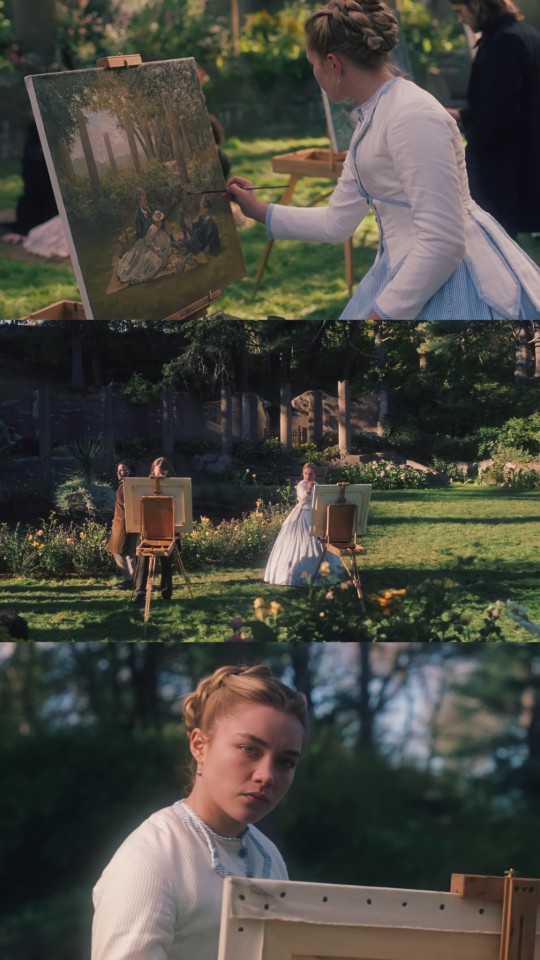



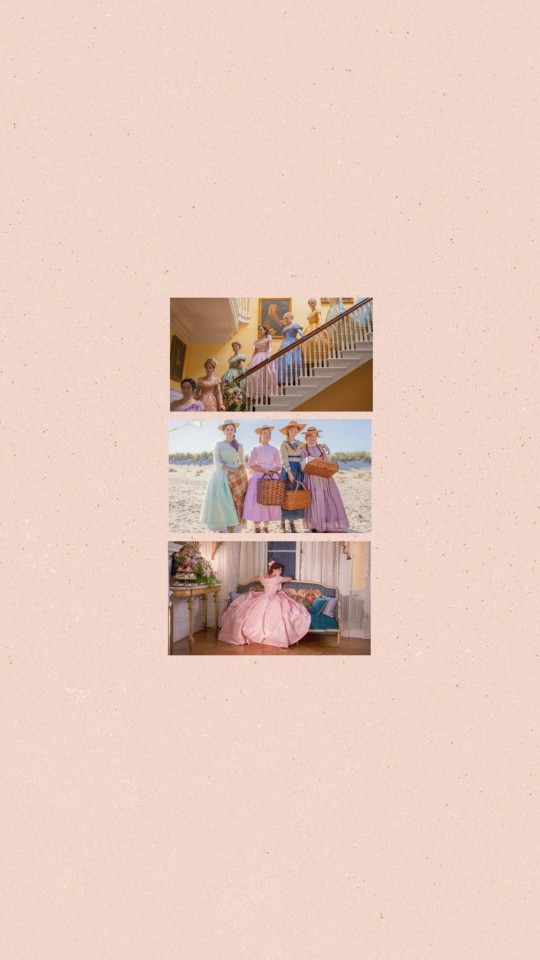
please like/reblog if you save!
more lw 2019 lockscreens here!
#little women#little women lockscreens#little women wallpapers#little women 2019#jo march#friedrich bhaer#amy march#theodore laurence#laurie laurence#john brooke#meg march#jo x bhaer#march sisters#emma watson#louis garrel#james norton#florence pugh#saoirse ronan#perioddramaedit
168 notes
·
View notes
Text
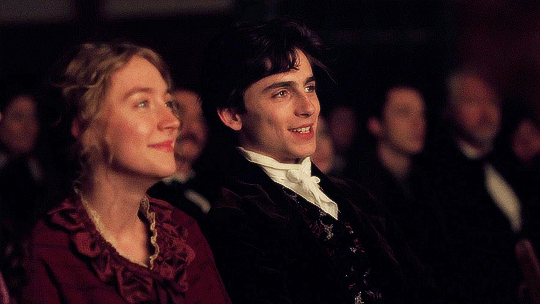
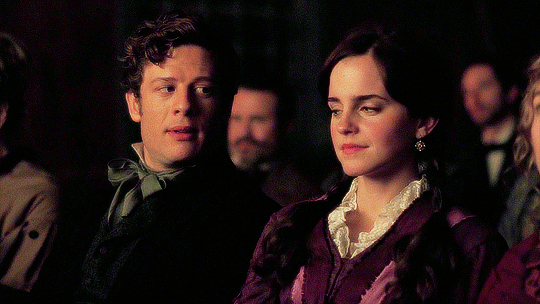
—Little Women, (Greta Gerwig, 2019)
#Little Women (2019)#Meg March#John Brooke#Emma Watson#James Norton#Saoirse Ronan#Jo March#Timothée Chalamet#Theodore “Laurie” Laurence
170 notes
·
View notes
Text
If I had a penny every time there was a nineteenth century book with a dignified and responsible woman named Margaret who is deeply connected to her sibling(s) and falls in love with a stoic gentleman named John who is involved with education and has a close relationship with Margaret’s father, I’d have two pennies. Which isn’t a lot but it’s weird that it happened twice.
#mine#books#classic lit#north and south#elizabeth gaskell#little women#louisa may alcott#meg march#john brooke#margaret hale#john thornton#these connections are pretty arbitrary but it’s still funny to me#phi rambles
16 notes
·
View notes
Text
Making my first ever animatic... This is really hard :')
I've just for blobs and lines right now but who knows, maybe I'll actually finish this :))
15 notes
·
View notes